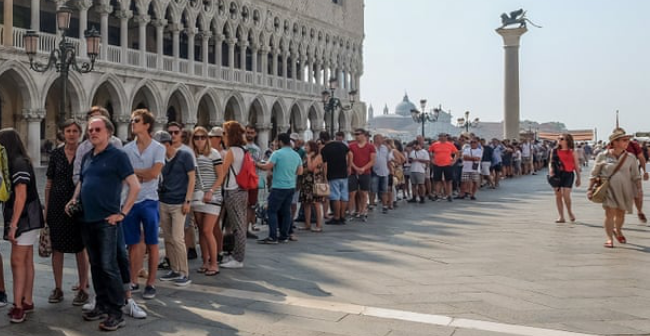
Day-trippers to Venice will be charged up to €10 (£9) to enter the famous city as authorities continue to deal with the tens of millions of tourists who visit every year. The Italian parliament approved the entry tax, which will range from €2.50 to €10 depending on the time of year. A similar system has been applied for Elba island, part of the Tuscan archipelago, and the Aeolian Islands off Sicily.
Luigi Brugnaro, the mayor of Venice, said the money collected would help do with the rubbish that day-trippers leave behind. It is unclear when the tax will be introduced or how it will be applied. Reports in the Italian press suggest it could be added to the cost of arriving in the city either by train, bus or ships, with the transport companies passing the earnings on to Venice authorities.
Each visitor will be charged a minimum fee of €2.50 throughout the year, rising to between €5 and €10 during peak periods. It will not affect those who have booked hotel rooms. Venice visitors already pay a tourist tax if they spend at least one night in the city. Venice has long struggled to manage a tourism industry that brings in about 30 million visitors a year, many arriving by cruise ship.
Gates were installed during peak periods this year in an attempt to reduce the number of the tourists to St. Mark’s Square and the Rialto Bridge. If the number gets too high, the gates will be closed and only those with hotel bookings or holding a Venezia Unica pass can come in, a card that is mainly used by residents but can be bought for €40 by anyone who uses a water bus. Authorities are also trying to encourage people to visit other lesser-known areas or one of its other islands, such as Murano and Burano.
本时文内容由奇速英语国际教育研究院原创编写,未经书面授权,禁止复制和任何商业用途,版权所有,侵权必究!(作者投稿及时文阅读定制请联系微信:400-1000-028)
1.Why will Venice charge the day-trippers the entry tax?
A To reduce the pressure of local tourism.
B To improve the earnings of the authorities.
C To carry out the policy by the Italian parliament.
D To make tourists visit other unknown scenic spots.
解析:选A。细节理解题。根据第一段第一句Day-trippers to Venice will be charged up to €10 (£9) to enter the famous city as authorities continue to deal with the tens of millions of tourists who visit every year.可知威尼斯向一日游旅客征税是为了缓解当地的旅游压力。故选A。
2.What will the collected money be used for according to Luigi Brugnaro?
A Buying more vehicles.
B Clearing up the rubbish.
C Paying transport companies.
D Funding Italian parliament.
解析:选B。细节理解题。根据第二段第一句Luigi Brugnaro, the mayor of Venice, said the money collected would help do with the rubbish that day-trippers leave behind.可知税收收入将用来处理游客留下的垃圾。故选B。
3.Which of the following is NOT true according to the passage?
A The entry tax has received parliamentary support.
B It’s clear that the entry tax will be added to the transport costs.
C Visitors spending the night in Venice will not be affected by the entry tax.
D Day-trippers holding a Venezia Unica pass can still enter during peak periods.
解析:选B。细节理解题。根据第二段第二句It is unclear when the tax will be introduced or how it will be applied.可知现在并不清楚该进城税怎样实施。故选B。
4.What’s the passage mainly about?
A The Italian parliament has passed Venice’s entry tax.
B Venice will reduce the number of tourists from this year on.
C Venice’s tourism industry has long been overburdened.
D Venice is to charge day-trippers the entry tax.
解析:选D。主旨大意题。通读全文可知,本文主要围绕威尼斯将对一日游的旅客征收进城费这一话题展开。故选D。